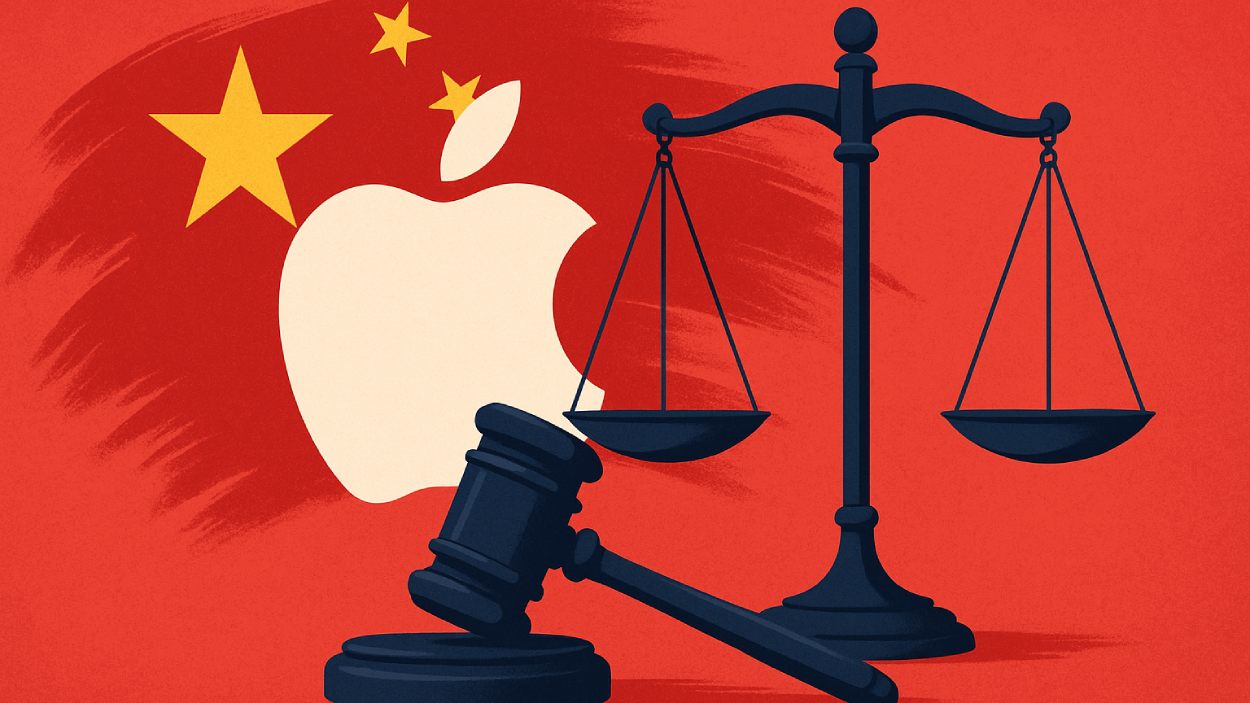Apple is facing fresh regulatory pressure in China as a group of users files an antitrust complaint targeting the company’s control over app distribution and payments.
Quick Summary – TLDR:
- A group of 55 Chinese users has filed an antitrust complaint against Apple with China’s top market regulator.
- The case accuses Apple of monopolistic control over iOS app distribution and exclusive use of its in-app payment system.
- China’s regulator is investigating Apple’s 30% commission and comparing it with global standards.
- The case could impact billions in App Store revenue and challenge Apple’s business model across multiple markets.
What Happened?
Apple is now at the center of a formal antitrust complaint in China, filed by 55 local iPhone and iPad users. The complaint, submitted to the State Administration for Market Regulation (SAMR), claims that Apple forces app downloads and payments exclusively through its App Store and its proprietary In-App Purchase (IAP) system. These practices, the complaint alleges, restrict competition and violate China’s Anti-Monopoly Law.
This isn’t Apple’s first legal tangle in China. A similar lawsuit filed in 2021 was dismissed, but the case is still under appeal. The lawyer behind that case, Wang Qiongfei, is now leading this renewed challenge under a more assertive regulatory environment.
In a complaint filed with China’s market regulator, a group of 55 Chinese iPhone and iPad users accused Apple of abusing its market dominance by restricting app distribution and payments to its own platforms while charging high commissions https://t.co/Vb6yFVwJ3z pic.twitter.com/Y36Le9C08I
— Reuters Legal (@ReutersLegal) October 20, 2025
Apple’s App Store Business Model Under Fire
The core of the complaint focuses on Apple’s alleged monopoly over app distribution for iOS in China. Users claim they are locked into Apple’s ecosystem, where the company not only restricts downloads to its App Store but also enforces the use of its own payment system for all digital purchases. Apple charges up to 30% in commission on these transactions, which the complainants say unfairly raises prices and stifles developer competition.
Chinese regulators are particularly scrutinizing Apple’s commission structure. Compared to China’s 30% rate for standard enterprises and 15% for small businesses, other regions like the US, South Korea, and the EU offer lower fees. This raises questions about whether Apple’s pricing in China is disproportionately high.
In 2024 alone, Apple reportedly made around $6.44 billion in App Store commissions from Chinese users. That figure represents roughly 10% of its China revenue and illustrates just how important this market is to Apple’s services business.
Legal Landscape: What Could Happen Next?
Although the complaint has been filed, the legal path remains uncertain. China’s antitrust penalties have historically been modest. In 2024, abuse-of-dominance fines totaled around RMB 106.9 million (approximately $15 million). More commonly, SAMR relies on soft tools like administrative interviews and reminder letters, which accounted for over 90% of its regulatory actions last year.
Still, if SAMR pushes for changes similar to those seen in the EU or US, Apple might be compelled to allow alternative payment systems or third-party app stores in China. That could open the door for domestic players like Alipay or WeChat Pay to handle iOS transactions, fundamentally shifting the power dynamics in China’s mobile app economy.
Companies offering compliance tools, risk management, and payment systems are also watching closely, as changes to Apple’s policies could drive demand for new service integrations.
Global Pressure Mounts
China’s move adds to Apple’s growing list of regulatory challenges around the world. In Europe, Apple was recently fined €500 million and ordered to allow sideloading and third-party payment options. Japan is requiring similar concessions by the end of 2025. This mounting pressure is putting Apple’s closely guarded ecosystem model in jeopardy.
Apple’s past compliance in China has already included removing VPN apps and partnering with state-affiliated Guizhou-Cloud Big Data to host local iCloud data. Such compromises have raised concerns about the company’s privacy stance and global brand identity.
Strategic Shifts Already Underway
Apple has been gradually shifting its strategy to adapt to global changes. The company is ramping up manufacturing in India, aiming for 25% production outside China by 2025. It’s also expanding its presence in markets like Indonesia and Brazil, where it hopes growing middle classes and rising smartphone usage will offset losses in China.
But success in these new regions won’t come easy. Local competitors like Xiaomi and Vivo dominate with lower prices and innovative features, often tailored with AI tools that Apple can’t easily replicate under Chinese regulations. Apple’s premium pricing strategy will need a serious rethink to gain traction in price-sensitive markets.
SQ Magazine Takeaway
Honestly, this is one of those moments where Apple has to decide what kind of company it wants to be going forward. It has long defended its closed ecosystem as a way to protect users, but now regulators worldwide are calling it out for being too controlling. In China, where geopolitical tensions are already sky high, this new complaint could be the tipping point. If Apple loses exclusive control over its App Store there, it won’t just lose money. It’ll lose leverage. Apple has the cash and talent to adapt, but it will need to drop its one-size-fits-all strategy and embrace a more flexible approach. The world is changing, and Apple needs to move with it.


































































